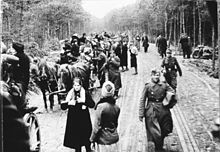Trek
A stretch ( low German stretching , Middle Low German trek or Dutch / afrikaans trek ; of trekken , medium high German trekking or slow down German trekking , intensive formation to medium high German trechen , "pull."; See also latin trahere , "pull" or tractor (straightener) = Tractor) is a long-term train of pedestrians, mounted people or wagons that lasts for days to years .
Settler treks
The term trek received its meaning as a train of settlers mainly through the Great Trek of the South African Boers in the 1830s. These events have gone down in the collective founding myth of this population group. The term was then taken from Afrikaans into English, which is why it keeps the spelling "trek", which is unusual for English.
It was applied to the trains of settlers and pioneers in North America in the 19th century. The settlers brought it play in many Western - movies (and documentaries ) play a role; Occasionally one is here covered wagon - romance stylized (eg by photographs of the often magnificent landscape.). The term also appears in the title of the science fiction television series Star Trek , which its inventor Gene Roddenberry described as " Wagon Train to the stars" in reference to a western series popular in the 1960s .
Refugee treks
The word, which is rarely used in German, only made its way into everyday language in the face of the influx of refugees at the end of the Second World War . In the winter of 1944/45 the first refugee treks started in front of the Russian front in East Prussia , West Prussia , Pomerania , Silesia and the Sudetenland and the like. a. westward. At least two million people died.
Since then, a common train of emigrants , but also of refugees or displaced persons from their homeland to another area, has been referred to as a trek , often as a result of changes in national territories in wars and using primitive means of transport , i.e. on foot and often with draft animals Overloaded wagons ( carts or covered wagons with all belongings that can still be transported ) over a long distance . Due to exhaustion, illness and poor care, many people and animals are overwhelmed and do not achieve their goal.
The escape in the trek is z. B. portrayed by Siegfried Lenz in his novel Heimatmuseum .
See also
- Expulsion
- Displaced person (Federal Expellees Act)
- Resettlers
- march
- Trekking
- Western The Great Trek with John Wayne ( 1930 )
- Star Trek
